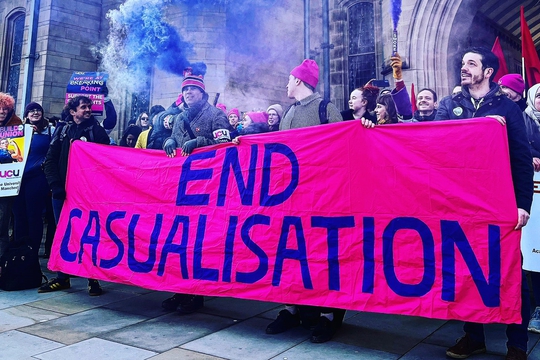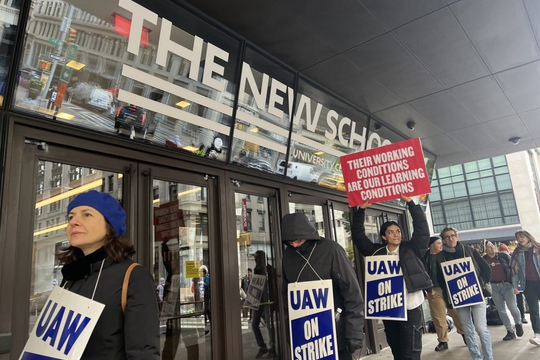Casualisation: Our Red Line
by
The University Worker
April 24, 2023
A University Worker editorial, on the UCU marking and assessment boycott and the need to end casualisation.

bulletins
Casualisation: Our Red Line
by
The University Worker
/
April 24, 2023
A University Worker editorial, on the UCU marking and assessment boycott and the need to end casualisation.
At long last, UCU has initiated the Marking and Assessment Boycott. After the most recent eballot, members have decided to suspend further industrial action on the USS dispute, while carrying on the fight over pay and pay-related issues. This means we are taking a summer MAB on an aggregated ballot mandate exclusively over the Four Fights.
This situation is unprecedented. For the first time, UCU branches across the sector are poised to target one of the main choke points of the academic labour process (summer marking and graduation) over pay and conditions. With a recently renewed ballot, this puts university workers in an incredibly strong position. More uniquely, we are approaching national bargaining with the power to gain serious concessions on the issue of casualisation. If binding on all employers in the sector, such concessions would qualitatively transform the sector as we know it.
However, this interpretation of the situation is not one the national union leadership has subscribed to. Instead, the General Secretary has glibly remarked that only a couple of % more on pay would suffice to call the action to an end. This indicates that for the leadership, the issue of casualisation is merely window-dressing which has helped shore up support for demands which squarely benefit permanent members.
The leverage we now have at our disposal puts us in a stronger position than at any other time in the history of the Four Fights dispute. This fact has been clearly demonstrated by the way institutional managers are coordinating quasi-legal deduction levels to crush the MAB before the action has even started to bite. And this leverage will accumulate as marking deadlines pass. Walking away from our current position, as our industrial power grows, with a few % more on pay and the same ‘death by committee’ deal on casualisation is untenable. This would be a sell-out of casualised university workers of historic proportions.
UCEA has long known that casualisation is the scourge of the sector, but has only recently conceded to negotiating on the issue. This means that a term which politically describes the decomposition of labour in our workplaces has been accepted into the terms of negotiations. This is a significant victory in the battle of ideas, but is clearly not enough.
Of all the Four Fights, ‘eradicating casualisation’ would cost the employer the most and have the farthest reaching consequences. Not only would employers have to pay for it in money, they would have to pay for it in flexibility - a currency of a different order in the just-in-time university. For this reason, UCEA will never honour anything they are not bound to. It is imperative therefore that a red line of the MAB must be that any agreed provisions on tackling casualisation must be binding.
Some argue that casualisation is too unwieldy to comprehensively remedy in negotiations, that ‘casualisation cannot be eliminated overnight’. Wilfully or not, these people are perpetuating ignorance of the solutions that are already out there across the sector. There are sector-best provisions on different aspects of casualisation and these should be the basis of the ‘national framework to eliminate precarious employment practises’ which is part of our demands. In previous bulletins we’ve listed concrete demands that could make up a comprehensive package of nationally binding provisions to tackle casualisation. If members are expected to face disproportionate deductions for participating in the MAB, they need to know exactly what they are striking for. And if we’re demanding a national framework for regulating casualisation, which is unlikely to be revised for a very long time, it needs to be right.
We cannot afford to be gradualist in addressing casualisation. The structural tendencies of labour casualisation in the sector are stark and impact us all. Just look at this graph produced as part of a recent and damning report by LSE UCU:

This current model for HE is built on the hyper-exploitation of a second tier of workers, who are forced to jump from contract to contract (if they’re lucky enough to get a contract) juggling teaching at multiple institutions with next to no paid prep time. This is unsustainable and is directly tied to the erosion of the conditions, rights and numbers of permanent contracts in the sector. We must throw everything behind this action. There are no excuses to do otherwise.
The organisational difficulties of a MAB are real and these shouldn’t be downplayed. But we’re already seeing a real effort by the rank and file to share resources and advice to support the action across branches. Participation in national and local training sessions also appears to be strong. This is promising and should go further.
The course of this action will define the future of our union and our sector. A victory on casualisation could fundamentally transform the political orientations of the union for years to come. A sell-out on casualisation could irrevocably crush a decade of momentum that emerged in the afterlife of the student movement, and carried precarious workers’ politics into the agenda of a university workers union. We will be on the side of casualised workers.
author
The University Worker
Subscribe to Notes from Below
Subscribe now to Notes from Below, and get our print issues sent to your front door three times a year. For every subscriber, we’re also able to print a load of free copies to hand out in workplaces, neighbourhoods, prisons and picket lines. Can you subscribe now and support us in spreading Marxist ideas in the workplace?
Read next


